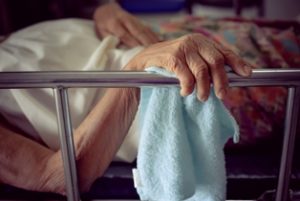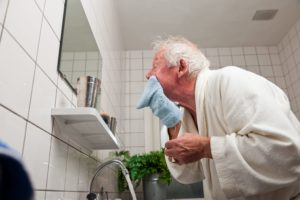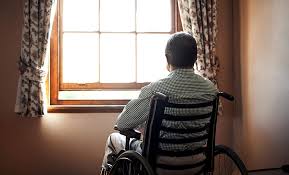
Unfortunately, nursing home abuse cases are far too commonplace in today’s society.
With nearly 2 million nursing home residents in the United States alone, many nursing homes are underfunded and understaffed, leaving our aging loved ones to suffer improper care and attention.
While most Americans feel like they have done their homework prior to choosing the right home for their loved one, it’s extremely important to check in with them as much as possible and monitor the situation.
It’s important to understand the different types of nursing home abuse and recognize the early warning signs.
Visible injuries are the most obvious warning signs of elder abuse, specifically physical abuse.
They are also the most commonly overlooked. Many nursing home residents, particularly older men, tend to bruise easily due to aging muscle tissue and medications such as blood thinners.

According to the U.S. Health and Human Services inspector’s General Office, there were an estimated 8,000 cases of potential abuse in 2018 that were never properly reported.
Other early warning signs of injuries include cuts and even broken bones…
Every year tens of thousands of nursing home residents are brought into emergency rooms all across the country.
The CDC estimates that approximately 1 in 5 of those ER visits is due to some sort of elder abuse.
While injuries can most certainly be warning signs of physical abuse, it’s important to remember that physical injuries are clues, not absolute proof.
If you believe injuries to your loved one are a sign of abuse by a nursing home care provider, report it right away.
Visible injuries are not the only warning signs of elder abuse…
One of the most insidious types of abuse that happens in nursing homes is malnourishment and dehydration.
Malnourishment in nursing homes presents itself in the form of extreme weight loss, in addition to a number of other side effects.

Overpopulation and understaffing can commonly lead to the neglect of residents, resulting in elderly residents going without meals, and sometimes even water.
If residents do not receive adequate nutrients and fluids, they can quickly become malnourished.
Malnutrition is especially dangerous to the elderly and can lead to serious health issues including diabetes and heart disease.
Poor hygiene of residents and the facilities are far too common in nursing homes.
Poor hygiene of the residents can be an early sign of nursing home abuse.
Residents living in unsanitary conditions, or living in poor physical hygiene are more susceptible to disease-carrying germs that can easily spread throughout a nursing home of elderly and at-risk residents.

Nursing home resident’s immune systems are not properly equipped to fight off the types of germs that can arise out of having poor hygiene.
Warning signs of poor hygiene in nursing homes include:
Depression can also be an indicator of elder abuse in nursing homes.
All 7 types of elder abuse may lead to a resident becoming depressed.
Depression presents itself differently in almost everyone, and can commonly be overlooked when it comes to the elderly.

Depression in nursing homes is common, as coping with end of life is not an easy task…
However, being unhappy is not the same as being depressed. Depression is often a warning sign or consequence of trauma and abuse.
Common signs of depression in nursing homes include:
It’s no secret that the elderly are prone to memory problems and can sometimes be forgetful…
But could that be a sign of elder abuse?
The answer is… YES
Memory loss is a natural defense mechanism humans develop in order to protect themselves from psychological damage.
This survival skill is typically triggered when victims have experienced something so traumatic, their brain subconsciously suppresses the memory completely.

In nursing homes, physical, sexual, and even emotional abuse have been known to lead to dissociative amnesia, which allows the resident to cope with the trauma by temporarily forgetting the details of the experience.
Trauma-induced memory loss is very different than age-associated memory impairment, dementia, or even Alzheimers, though is commonly confused.
It’s important to know the difference in order to spot the warning signs of elder abuse.
| Normal Aging | Trauma-Induced Memory Loss (Dissociative Amnesia) |
| Not being able to remember details of a conversation or event that took place a year ago | Sudden inability to remember past experiences |
| Not being able to remember the name of an acquaintance | Sudden inability to remember personal information and/ or family members |
| Forgetting things and events occasionally | Frequent confusion |
| Occasionally have difficulty finding words | Depression |
| You are worried about your memory but your relatives are not | Your relatives are worried about your memory, but you are not aware of any problems |
While it’s not a visible sign of elder abuse, arguably the most important warning sign is your gut.
Like the old adage says, “it’s better safe than sorry”…
If something feels awry, something feels different with your loved one, even if you don’t have any physical proof of abuse, it cannot hurt to investigate your gut feeling a bit further.
The most common warning sign of nursing home abuse is a family member’s concern that something is not right, or an unexplained feeling of unease when they visit.
If nursing home abuse is suspected, please follow these 7 simple steps:
If you or a family member has been suffering from abuse or neglect at a nursing home, long-term care facility, or skilled nursing facility, you may be eligible for compensation.
Our affiliated nursing home abuse attorneys are there to fight for a favorable outcome for your unique situation.
Get in touch with us today for a FREE no-obligation consultation. A lawyer will be in touch to discuss your unique situation and evaluate your potential case.
There are no fees unless you win your case. Call today!